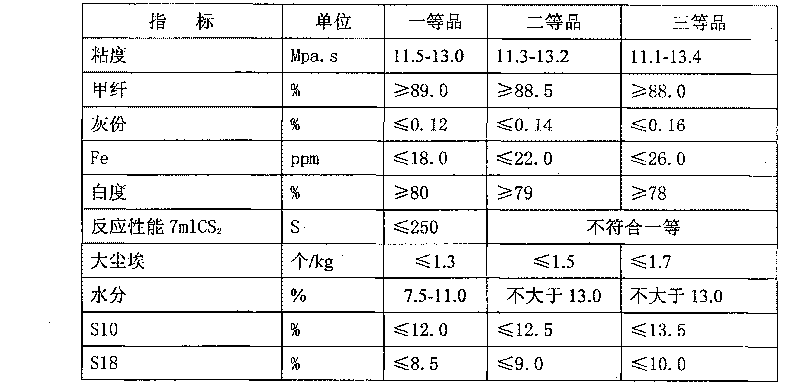Paper-making-stage primary color wood pulp plate denaturalization producing technique
A production process, wood pulp board technology, applied in the direction of papermaking, paper machine, pulp bleaching, etc., can solve the problems of slow dissolution of hemicellulose, severe conditions, and difficulty in reducing polymerization, so as to reduce production costs, increase methylcellulose content, The effect of reducing pollution
- Summary
- Abstract
- Description
- Claims
- Application Information
AI Technical Summary
Problems solved by technology
Method used
Image
Examples
Embodiment 1
[0042] Embodiment 1: sulfate method one
[0043] 1. Use 6000Kg of paper-making grade primary color wood pulp board, and sort through the pager.
[0044] 2. Soak into a 7.5% (4.5-8) pulp porridge with 18% (13-18) NaOH.
[0045] 3. Use the porridge pump to send it into the press to squeeze and loosen the dispersed fibers.
[0046] 4. Put the pressed wood pulp into the digester for cooking. The process conditions are: (1) Cooking agent: NaOH+Na 2 S(NaOH), the total alkali concentration of the cooking liquid is 90g / l (60-110), and the liquid ratio is 1:3.5; (2) The initial temperature of the cooking liquid is ≥40°C; (3) Preheating for 10-15 minutes to 105±5 ℃; (4) Stop steam and then run dry for 25 to 30 minutes; (5) Use 2 small steam releases and 3 heating curves, with a total heating time of 2 hours; (6) Holding temperature 170±2°C (155-172) .
[0047] 5. Send the above-mentioned wood pulp slurry obtained by cooking from the dumping tank to the squeeze washing material to extr...
Embodiment 2
[0051] Embodiment 2: sulfate method two
[0052] 1. Use 6000Kg of paper-making grade primary color wood pulp board, and sort through the pager.
[0053] 2. It is 6.5% (4.5-8) pulp porridge with 14% (13-18) NaOH dipping into concentration.
[0054] 3. Use the porridge pump to send it into the press to squeeze and loosen the dispersed fibers.
[0055] 4. Put the pressed wood pulp into the digester for cooking. The process conditions are: (1) Cooking agent: NaOH+Na 2 S, the total alkali concentration of the cooking liquid is 100g / l (60-110), and the liquid ratio is 1:3.5; (2) The initial temperature of the cooking liquid is ≥40°C; (3) Preheating for 10-15 minutes to 105±5°C; ( 4) Turn off the steam and then run dry for 25-30 minutes; (5) Use 2 small steam releases and 3 heating curves, and the total heating time is 2 hours; (6) The holding temperature is 160±2°C (155-172).
[0056] 5. Send the above-mentioned wood pulp slurry obtained by cooking from the dumping tank to the sq...
Embodiment 3
[0060] Embodiment 3: Sulfate method three
[0061] 1. Use 6000Kg of paper-making grade primary color wood pulp board, and sort through the pager.
[0062] 2. Dipping into a 5.5% (4.5-8) pulp porridge with 10% (13-18) NaOH.
[0063] 3. Use the porridge pump to send it into the press to squeeze and loosen the dispersed fibers.
[0064] 4. Put the pressed wood pulp into the digester for cooking. The process conditions are: (1) Cooking agent: NaOH+Na 2 S, the total alkali concentration of the cooking liquid is 110g / l (60-110), and the liquid ratio is 1:3.5; (2) The initial temperature of the cooking liquid is ≥40°C; (3) Preheating for 10-15 minutes to 105±5°C; ( 4) Turn off the steam and then run dry for 25-30 minutes; (5) Adopt 2 times of small steam release and 3 times of heating curve, the total heating time is 2 hours; (6) The holding temperature is 150±2°C (155-172).
[0065] 5. Send the above-mentioned wood pulp slurry obtained by cooking from the dumping tank to the sque...
PUM
 Login to View More
Login to View More Abstract
Description
Claims
Application Information
 Login to View More
Login to View More - R&D
- Intellectual Property
- Life Sciences
- Materials
- Tech Scout
- Unparalleled Data Quality
- Higher Quality Content
- 60% Fewer Hallucinations
Browse by: Latest US Patents, China's latest patents, Technical Efficacy Thesaurus, Application Domain, Technology Topic, Popular Technical Reports.
© 2025 PatSnap. All rights reserved.Legal|Privacy policy|Modern Slavery Act Transparency Statement|Sitemap|About US| Contact US: help@patsnap.com



